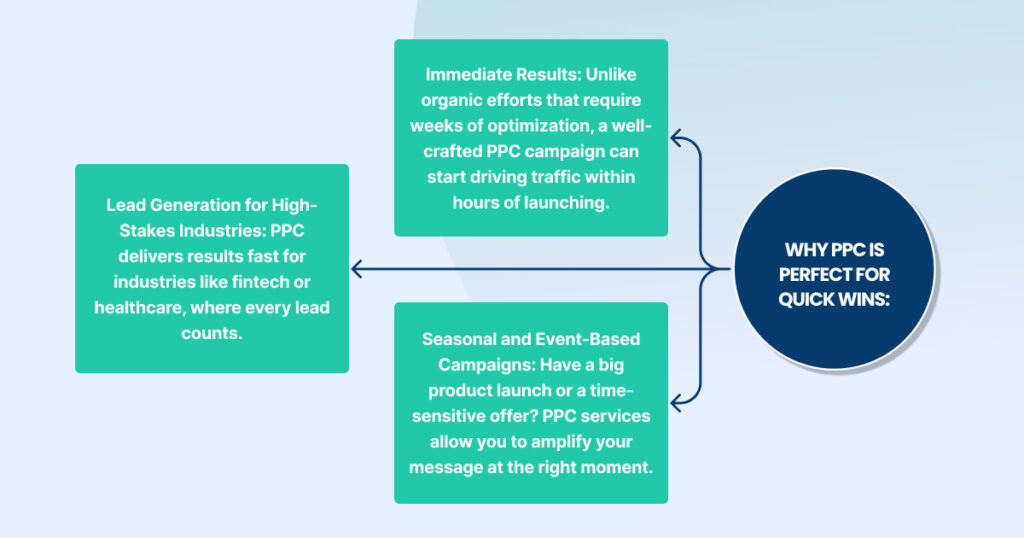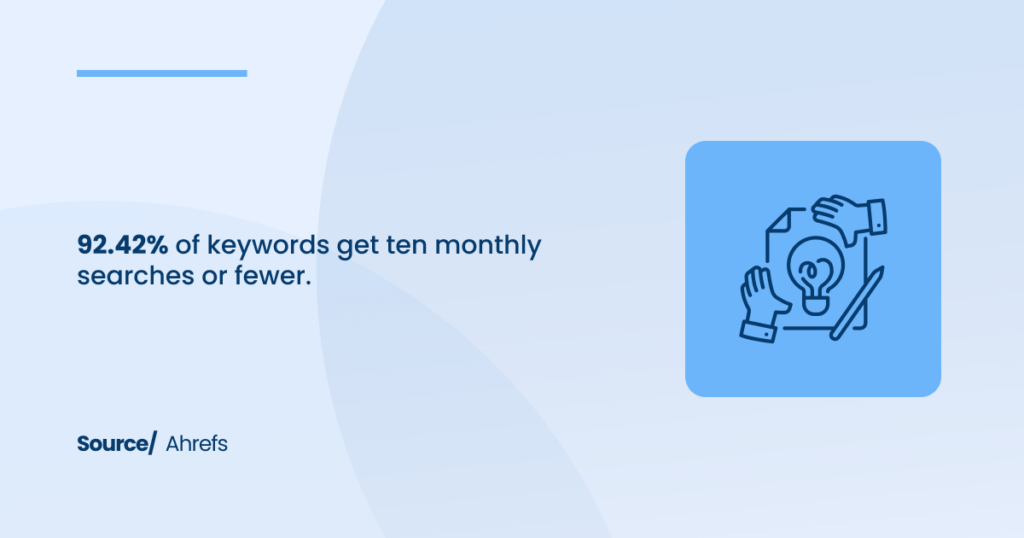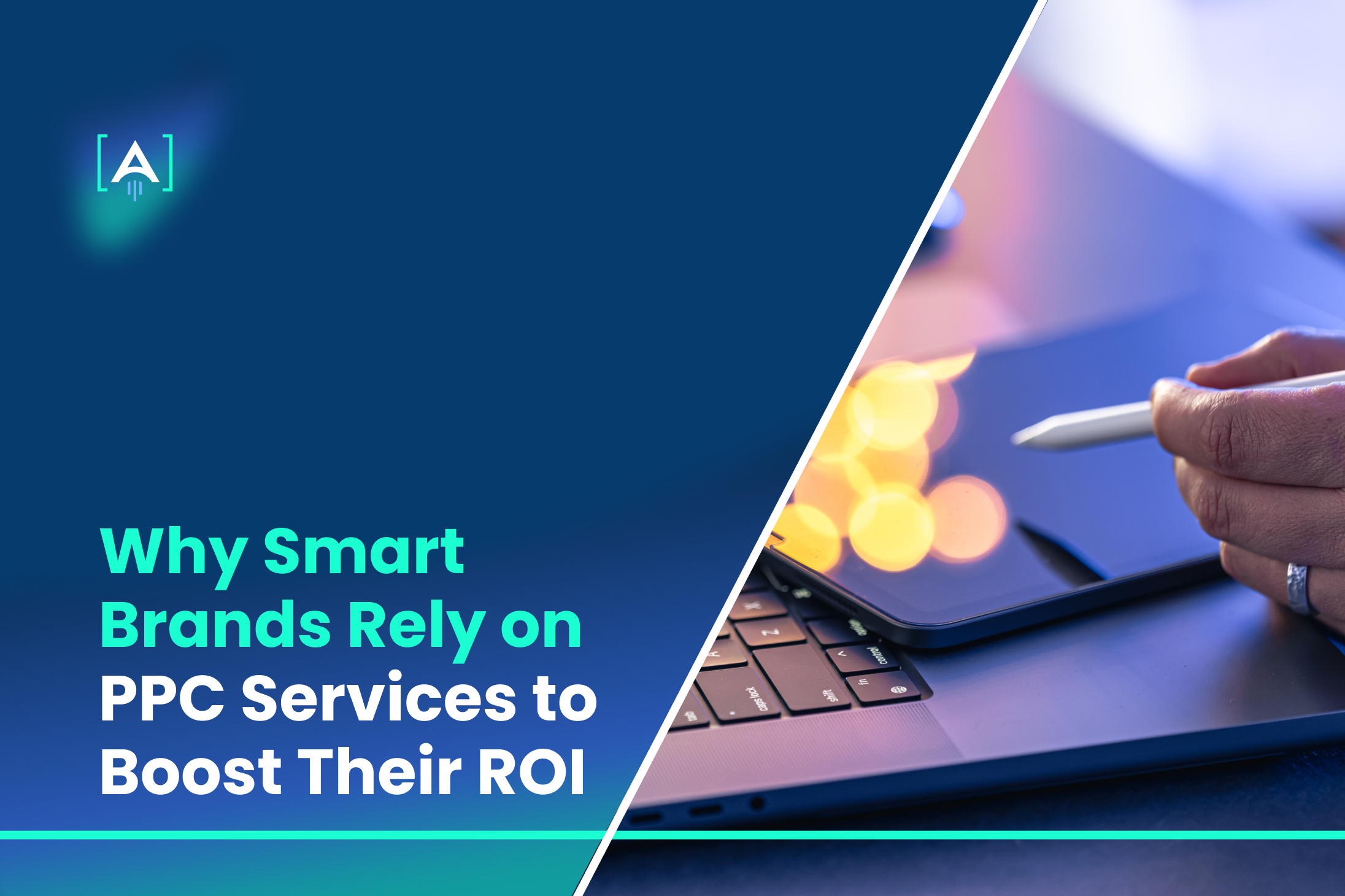If you’ve just launched a new product, you must get it in front of the right audience.
You’ve spent hours crafting the perfect message and designing eye-catching visuals. But then, nothing.
The traffic trickles in, but conversions? Crickets.
What if there was a way to instantly connect with people actively searching for what you’re offering?
Pay-Per-Click or PPC advertising will be the strategy that smart brands use to ensure their marketing dollars don’t just work hard but work smart.
In 2024, search advertising spending amounted to 211.76 billion U.S. dollars worldwide.
Source: Statista
The expenditure was forecast to increase by approximately six percent annually until 2028, reaching close to 261 billion U.S. dollars.
With PPC, every click has a purpose. If you partner with a reliable PPC Agency, you will drive sales, generate leads, and boost your brand’s awareness.
PPC is like turning on a digital spotlight, ensuring your business stands out in a sea of competitors.
In this post, we’ll explore why the savviest brands rely on PPC services to maximize their return on investment and how you can leverage the same strategies to take your business to the next level.
Why Clicks Aren’t Just Clicks: The Power of PPC
If you’re a marketer trying to make the most of every dollar spent, you’ve probably wondered: How can I reach people ready to act?
This is where PPC services shine.
Unlike traditional advertising, which broadcasts messages to broad audiences (think billboards or TV ads), PPC campaigns are laser-focused on specific users already searching for what you offer.
PPC’s Precision Targeting: Connecting with the Right Audience
Here’s the magic: PPC services allow you to target users based on demographics, location, behaviors, and even their search intent.
That means you’re not just shouting into the void; you’re speaking directly to the people most likely to buy, sign up, or engage.
You’re a fintech company offering a SaaS product that simplifies bookkeeping for small businesses.
By using PPC platforms like Google Ads, you can target:
- Keywords: “bookkeeping software for small businesses” or “best SaaS tools for accounting.”
- Demographics: Entrepreneurs aged 25-45 in metropolitan areas.
- Behavioral Data: Users who’ve recently searched for financial management tools.
And guess what? The same PPC strategy can be adapted for a B2B company targeting executives or a B2C brand selling fitness equipment.
💡 Example: A B2C brand selling high-quality yoga mats might run paid ads targeting keywords like “best yoga mats for beginners” while also running display ads featuring calming imagery to appeal to their health-conscious audience. This dual approach ensures they’re reaching both active searchers and passive browsers.
When Speed Matters: PPC for Quick Wins
Sometimes, businesses don’t have months to wait for results.
Organic marketing strategies, like SEO, take time to build momentum.
While valuable in the long run, they’re not ideal when you need immediate traffic, leads, or sales. That’s where PPC becomes essential.

Example: A B2B SaaS company targeting CFOs of large corporations can create a PPC Checklist targeting keywords like “financial planning tools for enterprises” during Q4 when budget planning is critical. The campaign can also offer gated resources (e.g., “Download our ROI Calculator”) to collect high-value leads quickly.
💡 Pro Tip: To make your ads even more actionable, include ad extensions—like site links, call buttons, or downloadable PDFs.
From Search to Sale: How PPC Drives ROI Like a Pro
If you are trying to sell snow boots to a beach vacationer or gourmet coffee to someone who prefers tea, this won’t make sense, right?
That’s why PPC services stand out—they ensure you reach the audience most likely to engage with your products or services.
Why Targeting the Right Audience Is a Game-Changer
The beauty of PPC marketing lies in its ability to show ads only to people who matter most.
It’s not about blasting your message everywhere—it’s about focusing on the individuals who are most likely to convert.
How does PPC optimization make targeting so precise?
- Demographics: Narrow down your audience by age, gender, income, or education level.
- Example: A fintech app designed for millennials might target users aged 25-35 with an interest in financial planning.
- Interests: Platforms like Google Ads and Facebook Ads allow you to target people based on hobbies, online behaviors, or industry interests.
- Example: A SaaS company offering project management tools could target users interested in productivity apps and remote work solutions.
- Behaviors: Look at user actions like past purchases, website visits, or search history to create hyper-specific campaigns.
- Example: A B2B business selling CRM software might retarget users who visited their pricing page but didn’t sign up.
💡 Pro Tip: Use PPC management tools to refine these targeting options, ensuring every dollar spent delivers value.
B2B vs. B2C: Different Strategies, Same Goal
The approach to audience targeting varies depending on whether you’re confused about b2b vs. b2c.
While both aim to land the right audience, their methods differ.
- B2B PPC Targeting:
- Focus on decision-makers like CEOs, managers, or department heads.
- Use platforms like LinkedIn for professional targeting.
- Keywords: “Best PPC services for enterprises” or “Top CRM software for large teams.”
- Example: A SaaS company might run ads targeting HR managers interested in talent management software.
- B2C PPC Targeting:
- Appeal to emotional needs and lifestyle preferences.
- Use platforms like Facebook, Instagram, or TikTok for visual and engaging ads.
- Keywords: “Affordable yoga mats” or “Trendy sneakers for teenagers.”
- Example: A retail brand could run TikTok ads featuring influencers wearing their products, targeting younger audiences.
Beyond Keywords: Secrets to PPC Success
Running a successful PPC campaign is much more than choosing a few keywords and setting your budget. It’s about diving deep into the data, refining your approach, and leveraging tools to unlock insights that drive performance.
If you’ve ever wondered how to take your PPC services to the next level, the answer lies in understanding your data and using it strategically.
It’s All About the Data
Keyword research is the foundation of your PPC campaign.
Without it, you’re essentially throwing darts in the dark.
Tools like Ahrefs, Google Keyword Planner, or SEMRush are your flashlights, illuminating the keywords your audience is searching for and, just as importantly, the ones they’re ignoring.

Take an e-commerce brand selling organic skincare products, for example.
They could use Ahrefs to uncover high-traffic keywords like “best organic face cream” while identifying long-tail phrases like “affordable natural skincare for dry skin.”
These long-tail keywords might have lower search volumes, but they’re often gold mines for intent-driven searches, which means higher conversion potential.
However, it’s not just about finding keywords but understanding what they mean for your PPC bidding strategy.
Should you bid aggressively on highly competitive keywords or focus on cost-effective ones with lower competition? This is where data-led decisions come into play.
You can create a well-rounded PPC strategy that balances reach with ROI by analyzing metrics like search volume, cost-per-click (CPC), and conversion potential.
Negative Keywords: The Hidden Heroes of ROI
When it comes to PPC, not all keywords are created equal.
Some might bring you traffic, but not the traffic you want. This is where negative keywords step in to save the day.
Negative keywords act as a filter.
They ensure your ads aren’t shown to audiences searching for irrelevant terms.
For instance, if you’re managing PPC for e-commerce brands specializing in high-end jewelry.
You might bid on keywords like “luxury diamond rings” or “best engagement rings,” but without negative keywords, your ads could also appear for searches like “cheap wedding rings” or “DIY jewelry-making kits.”
These clicks drain your budget and lower your ad’s relevance score, affecting your placement in future auctions.
This is another example.
A SaaS company offering premium project management tools might want to avoid traffic for searches like “free project management software” or “basic task tools.” Including these as negative keywords keeps their ads focused on potential customers willing to pay for advanced features.
Why a PPC Audit is the Key to Better Performance
Think of a PPC audit as your campaign’s health check-up.
Without it, you’re essentially driving blind, unaware of what’s working and what’s not.
Regular audits let you identify gaps, refine targeting, and ensure every dollar spent is maximizing returns.
Why does it matter?
- Spot Underperforming Ads: Sometimes, an ad that seemed great on paper doesn’t deliver. An audit helps you pinpoint why—whether it’s poor ad copy, irrelevant keywords, or unoptimized bids.
- Check Budget Allocation: Are you overspending on low-performing keywords or need more opportunities on high-converting ones? A PPC audit highlights where your money is going and if it’s paying off.
- Evaluate Landing Page Alignment: Even the best ads won’t convert if the landing page doesn’t match user intent. Audits ensure that your landing pages are optimized for conversions.
How to Conduct a PPC Audit That Delivers Insights
Conducting an effective PPC audit doesn’t require being an expert—it just requires a structured approach.
Start with these steps:
Review Campaign Settings
Make sure targeting aligns with your goals. For example, if your goal is local traffic, your geo-targeting should reflect that.
Analyze Keywords
- Check for high-spending, low-performing keywords.
- Identify gaps where competitors might be outranking you.
- Add negative keywords (more on this later) to filter irrelevant traffic.
Examine Ad Copy
Look for ads with low click-through rates (CTR). Are they clear and compelling? Do they match search intent?
Inspect Bidding Strategies
Are you using manual bidding or automated strategies? Tools like Google Ads’ Smart Bidding can optimize bids for better ROI.
AI-Driven Bidding Strategies: Let the Bots Do the Heavy Lifting
Bidding is both an art and a science.
In the past, advertisers had to manually set and adjust bids, guessing which strategies would lead to success.
Today, AI-driven bidding strategies make life easier, smarter, and far more efficient by optimizing bids in real-time.
How AI Optimizes Bids in Real Time
AI is your assistant who works 24/7 to ensure your ads perform at their best.
AI-powered tools like Google Ads Smart Bidding analyze mountains of data faster than any human could.
These tools consider hundreds of factors—like user behavior, device, location, time of day, and even weather conditions—to determine the optimal bid for each auction.
Source: Survey Monkey
Imagine you’re running a PPC campaign for a law firm targeting potential clients in a local area.
AI tools can detect patterns in user searches—such as people searching for “personal injury lawyer near me” late at night—and automatically adjust bids to ensure your ad appears when they’re most likely to convert.
AI doesn’t just guess-it learns. Over time, it gathers more data about your audience and adjusts strategies accordingly, improving performance with every auction.
Automated vs. Manual Bidding: What’s the Difference?
Manual bidding is like driving a stick shift—you’re in complete control, but it can be exhausting and prone to errors.
Automated bidding, on the other hand, works like cruise control, making adjustments on the fly to optimize your journey.
Benefits of Automated Bidding:
- Time Savings: No more constant monitoring and tweaking. AI does the work for you.
- Real-Time Adjustments: Unlike manual strategies, which require delays for human input, AI reacts instantly to changes in user behavior or market trends.
- Performance Optimization: AI focuses on what matters most, like maximizing conversions or reducing costs, without wasting time or budget.
When Manual Bidding Still Makes Sense
Manual bidding can be useful for niche campaigns where you want to test specific strategies.
For instance, a fashion brand running a highly targeted campaign for a limited-edition product might prefer manual control to monitor its performance carefully.
However, for most PPC services, automated bidding is the way to go. It’s like having an experienced marketer working for you, 24/7, ensuring every bid counts.
Blending PPC with Other Marketing Channels: A Match Made in Heaven
In the world of digital marketing, no strategy should operate in isolation.
Think of PPC as the sprinter—it’s fast, precise, and delivers immediate results. Conversely, SEO is the marathoner—steady, consistent, and built for long-term success.
When you blend PPC with other channels like SEO and social media ads, you create a synergy that amplifies results across the board.
PPC + SEO: The Ultimate Power Couple
If you think PPC and SEO are competing forces, think again. These two strategies, when combined, can supercharge your marketing efforts.
Source: Brightedge
The best part? PPC insights can refine and elevate your SEO strategy, creating a feedback loop that benefits both channels.
How PPC Insights Supercharge SEO Strategies
PPC campaigns generate a treasure trove of data that can reveal how people interact with your ads, which keywords drive clicks, and what content converts best. These insights are pure gold for SEO efforts.
You’re running a PPC campaign for a local law firm.
Through PPC tools, you discover that “affordable divorce lawyer near me” consistently drives clicks and leads. This keyword might not have been part of your initial SEO strategy. Integrating it into your organic content can increase your visibility for paid and organic searches.
PPC also allows you to test keywords before committing to them in an SEO strategy.
Instead of spending months optimizing for a keyword that might not deliver, you can run a PPC campaign to gauge its performance in real-time. It’s like having a cheat code for SEO success.
Benefits of Combining PPC and Organic Search
The beauty of blending PPC and SEO lies in their ability to dominate search engine results pages (SERPs).
Imagine a SaaS company that ranks organically for “best project management tools” while simultaneously running PPC ads for the same keyword. This dual approach doubles your chances of being clicked while reinforcing your brand’s authority.
- Increased Brand Visibility: Appearing in paid and organic results builds trust with users.
- Cost Efficiency: As your organic rankings improve, you can reduce ad spending on keywords now delivering free traffic.
- Enhanced User Experience: By analyzing PPC performance, you can refine the content and intent behind your SEO strategy, creating a seamless experience for users.
PPC and SEO aren’t rivals—they’re teammates.
Together, they can make your marketing efforts smarter, faster, and more impactful.
Social Media Ads + PPC: Amplifying Your Reach
Social media advertising is often seen as PPC’s creative, visually-driven sibling.
But when these two channels work together, the result is a campaign that doesn’t just reach people—it resonates with them.
Synergies Between PPC and Paid Social Ads
While PPC tools focus on intent-driven users (those actively searching for solutions), paid social ads excel at creating demand among users who might still need to learn they need your product.
The combination ensures you’re covering both proactive and passive audiences.
Imagine a home services company running PPC ads targeting “roof repair near me.” They can complement this with Facebook ads featuring before-and-after photos of roof repairs, targeting homeowners in specific neighborhoods.
The PPC campaign captures those ready to act, while the social ads build brand awareness for future prospects.
Another example: A fashion brand can use Instagram ads to showcase new collections while running Google Shopping ads targeting high-intent keywords like “best fall jackets for women.” This cross-channel approach ensures you’re hitting users across multiple touchpoints.
Conclusion: The Power of PPC Services for High ROI
PPC services are a powerful investment in growth. By delivering precision targeting, real-time adjustments, and measurable results, PPC ensures your marketing dollars are spent where they matter most.
[A] Growth Agency will offer the full flexibility and scalability to meet your goals. Our team will create campaigns that generate leads, drive sales, and build lasting customer relationships.
Growth isn’t just what we offer; it’s who we are. We believe in the power of data to inform and drive every strategy, ensuring our actions are as effective as they are innovative.
From identifying high-performing keywords to crafting compelling ad copy and running in-depth PPC audits, we handle every detail with precision and expertise. Our strategies are tailor-made, and we’re confident in experiments to find the best path forward.
You only need to decide your next step.

